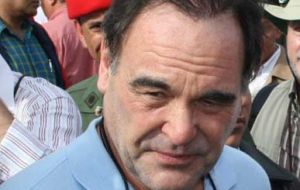MercoPress. South Atlantic News Agency
Stone blames Bush for failed release of Colombian hostages
 Oliver Stone in Colombia
Oliver Stone in Colombia Hollywood director Oliver Stone who was to film the liberation of hostages held by the Colombian cocaine funded guerrilla FARC at the end of December, accused the United States for the failure of the mission and defends the role played by Venezuela's president Hugo Chavez in the frustrated operation.
In an interview with the Sunday edition of The Observer, Stone defines President Chavez as an "honest man, a strong man and a soldier" and condemned the US for treating Latinamerica as the backyard to "throw trash, piss, do whatever the hell they want". During the frustrated release operation of two women and a child of one of them born in captivity, and which was scheduled for before Christmas and later for New Year, Stone was instructed to remain in the hotel, to ensure he was not kidnapped, although he ignored such instructions and spent his time "talking to murderers and coke dealers". However his trip ended in frustration and he returned to his home in California. "Chavez played a poker game where he was trying to really make this work, and I think that he couldn't do it alone". "From where I was standing, he was beating the drum to rescue these hostages and to break the ice in the ongoing war between the state and the rebels. I thought that it was a significant first move, and there was resentment towards him for this on the part of Colombia and the United States". Stone who gave the interview before it was known that the captive three year old child, named Emmanuel was not in the hands of the Revolutionary Armed Forces of Colombia, FARC, but rather in an orphanage in Bogota, blamed the failure of the operation on Colombian president Alvaro Uribe and the US government. Last Saturday the Colombian government accused the FARC of lying following the guerrillas admittance that they did not have the child, and blaming the Uribe administration of having "kidnapped" Emmanuel. "I listened from two rival sources on that day that Uribe had phoned George W Bush the day before or that same day. That phone call to Bush is most significant", underlined Stone. "I said at the time, shame on Colombia, shame on Uribe, and I meant to say shame on Bush, too. I think Bush has a spiteful attitude towards Chavez, as does the American establishment. They want to see Chavez fail. The New York Times had an article the next day saying: "Chavez's promised hostage release fizzles, his second major setback in weeks" If that's the headline, that's certainly a surprise to all those people who were down there, including the families of the hostages. It was a genuine effort to free them". Stone regards it as another chapter in the US's long history of interference and exploitation in Latin America, supporting dictators when in its own self-interest. "US seem to treat it as its backyard. I guess people do all kinds of things in their backyards. They throw trash, piss, do whatever hell they want, let the weeds grow. I think we've always had that idea, that it's ours". "Colombia is the last one we have left. It's a big investment; I gather we're talking almost a billion a year now. It is the equivalent of a secret war. In my time it would have been shocking, the equivalent of the Laotian war or the Cambodian war. The country is crawling with military equipment and US equipment and supervisory technologies - satellite technology, information technology. It exists for the FARC, I think they know that. They're very paranoid; they're right to be. Every Colombian that I spoke to was scared of the military in some way or another; they're the most dangerous people, not the FARC". FARC is regarded as a terrorist group by the US and the European Union and is thought to be holding up to 3.000 hostages in the country's eastern jungles. But Stone refused to condemn it outright. "I do think that by the standards of Western civilization they go too far; they kidnap innocent people. On the other hand, they're fighting a desperate battle against highly financed, American-supported forces that have been terrorizing the countryside for years and kill most of the people. FARC is fighting back as best it can and grabbing hostages is the fashion in which they can finance themselves and try to achieve their goals, which are difficult. They're a peasant army; I see them as a Zapata-like army. I think they are heroic to fight for what they believe in and die for it, as was Castro in the hills of Cuba", insisted Stone. When asked why he called Chavez a "great man", Stone said "because he's really made a difference. You sense a revolutionary spirit throughout Venezuela. He doesn't seem like a tyrant to me at all, he doesn't seem even like a strongman, he seems like a man who respects the law. He's abided by the constitution far faster than Bush has abided by our constitution".




Top Comments
Disclaimer & comment rulesCommenting for this story is now closed.
If you have a Facebook account, become a fan and comment on our Facebook Page!